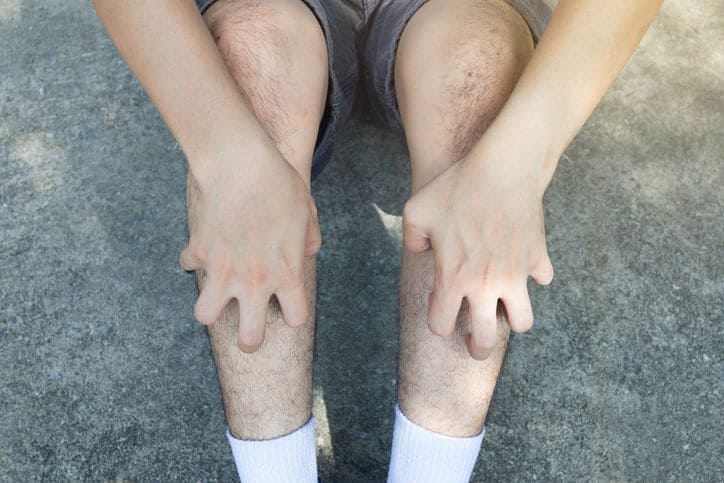Itchy Legs – Causes, Treatment, And Preventions
Itchy legs can be a frustrating and uncomfortable experience, often leading to incessant scratching and potential skin irritation. Understanding the underlying causes, appropriate treatment options, and preventive measures can help alleviate symptoms and promote healthier skin. Here’s a comprehensive guide to itchy legs:

Causes of Itchy Legs:
- Dry Skin: One of the most common causes of itchy legs is dry skin, especially during colder months or in arid climates. Insufficient moisture levels can lead to flakiness, redness, and itching.
- Allergic Reactions: Contact with allergens such as certain fabrics, skincare products, or environmental irritants can trigger allergic reactions, causing itching and skin irritation on the legs.
- Skin Conditions: Conditions like eczema, psoriasis, or dermatitis can manifest as itchy, inflamed patches on the legs due to underlying inflammation and immune system dysregulation.
- Insect Bites: Mosquitoes, fleas, or other biting insects can leave itchy welts on the legs, accompanied by redness, swelling, and irritation.
- Shaving Irritation: Shaving the legs with dull blades or harsh shaving products can cause irritation, razor burn, and itching as the hair grows back.
- Poor Circulation: Reduced blood flow to the legs, often due to conditions like venous insufficiency or peripheral artery disease, can result in itching, swelling, and discoloration.
- Medications: Certain medications, including antibiotics, antifungals, or pain relievers, may cause allergic reactions or side effects like itching as a symptom.
Treatment Options:
- Moisturize Regularly: Keep your legs well-hydrated by applying a gentle, fragrance-free moisturizer after bathing or showering to lock in moisture and prevent dryness.
- Avoid Irritants: Identify and avoid potential irritants such as harsh soaps, fragranced lotions, or abrasive fabrics that may exacerbate itching or skin sensitivity.
- Topical Treatments: Use over-the-counter hydrocortisone creams, calamine lotion, or antihistamines to alleviate itching and reduce inflammation caused by allergic reactions or skin conditions.
- Cool Compresses: Apply cool, damp compresses to the itchy areas on your legs to soothe irritation and provide temporary relief from itching.
- Prescription Medications: If over-the-counter remedies prove ineffective, consult a dermatologist for prescription-strength treatments such as topical corticosteroids, immunomodulators, or antifungal medications.
- Antihistamines: Oral antihistamines can help relieve itching associated with allergic reactions, insect bites, or skin conditions by blocking histamine receptors in the body.
Preventive Measures:
- Hydrate: Drink plenty of water to maintain optimal hydration levels, which can help improve skin elasticity and prevent dryness and itching.
- Protective Clothing: Wear breathable, loose-fitting clothing made from natural fibers like cotton to minimize friction and irritation on the legs.
- Sun Protection: Apply broad-spectrum sunscreen to your legs when exposed to sunlight to prevent sunburn and minimize the risk of skin damage and itching.
- Proper Shaving Techniques: Use sharp, clean razors and shaving creams or gels to minimize irritation and razor burn while shaving your legs. Shave in the direction of hair growth to reduce the risk of ingrown hairs and itching.
- Healthy Lifestyle: Maintain a balanced diet rich in vitamins, minerals, and essential fatty acids to support overall skin health and reduce the risk of skin conditions that may cause itching.
- Regular Exercise: Engage in regular physical activity to promote circulation and vascular health, which can help prevent conditions like venous insufficiency and peripheral artery disease that may contribute to itching in the legs.
conclusion:
By addressing the underlying causes, implementing appropriate treatment options, and adopting preventive measures, you can effectively manage and prevent itching in the legs, promoting healthier and more comfortable skin. If itching persists or worsens despite home remedies, consult a healthcare professional for further evaluation and personalized treatment recommendations.